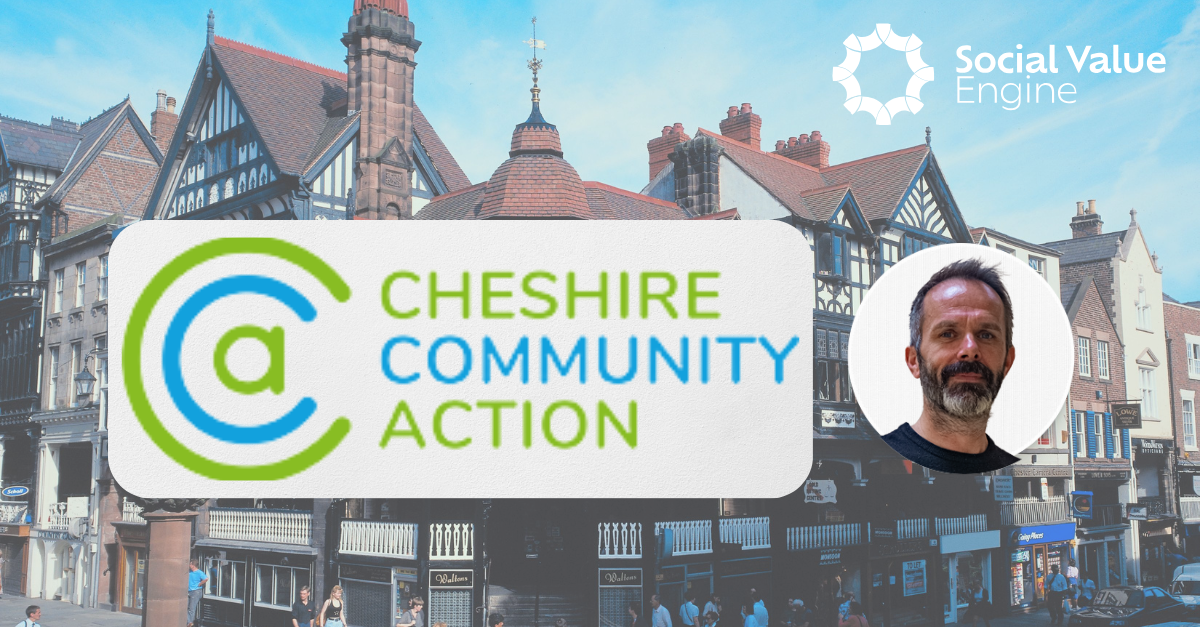Cheshire Community Action (CCA) is a rural community development organisation, part of a national network supporting community buildings, infrastructure projects, and policy initiatives across key sectors such as housing, digital inclusion, and healthcare. Led by Chief Executive Officer Mark Reading, the organisation is deeply involved in both strategic policy work and hands-on project delivery, including vital services that help people transition from hospital to home.
Recognising the growing need to demonstrate social value in a robust and credible manner, CCA explored various methods to quantify the impact of its work. The Social Value Engine (SVE) became a pivotal tool in this journey, offering a structured, evidence-based approach to measuring social value.
Challenge
Before adopting the Social Value Engine, CCA had experimented with different methods to measure impact, including tools such as the Housing Associations’ Charitable Trust (HACT) model and the Themes, Outcomes and Measures (TOMs) framework used in procurement. However, these models often failed to align with the unique needs of a third-sector organisation.
“As an organisation that bids for council contracts, we’ve come across TOMs, but it’s wholly inappropriate for a third-sector provider—it’s designed for developers building thousands of houses,” Mark Reading explains.
One of the biggest challenges was demonstrating the value of early intervention and prevention services. “If we’re providing support to person A, we might be preventing B, but how do you prove that? Because it’s an assumption, isn’t it?” he reflects.
Previously, impact measurement relied on a combination of spreadsheets, proxy financial values, and case studies. While this approach provided some insight, it lacked robustness and was often questioned by local authority funders. “We knew we were making a difference, but it felt messy—it just felt amateur,” Mark admits.
Solution
CCA turned to the Social Value Engine to introduce a more structured and transparent approach to measuring its social impact. Unlike previous tools, SVE offered an extensive library of validated proxies, an intuitive online platform, and clear evidence trails linking financial values to recognised data sources.
“You’ve got all the extra proxies—hundreds of them—that you wouldn’t see anywhere else. The links to where the financial assumptions are made let you test the thinking and look at the evidence base,” Mark highlights.
Additionally, the cloud-based system provided a live, continually updated resource, eliminating the risk of spreadsheet errors and ensuring that calculations were always accurate and defensible. “It’s more professional, it’s a paid-for service, and because someone else is looking after the backend, there’s just more trust in it,” he adds.
Benefit
The adoption of the Social Value Engine has significantly strengthened CCA’s ability to demonstrate the tangible impact of its projects. This has been particularly valuable when engaging with local authority commissioners and securing ongoing funding.
“It’s helped with the continuation of a couple of services,” Mark notes. “It’s also opened up important conversations with commissioners about what social value really means—are we measuring cash savings, or are we measuring people’s lives?”
The tool has also empowered CCA to advocate for smarter funding decisions. “A mental health intervention will save you a lot more money than financial inclusion advice, though both save money. The Social Value Engine lets us show this in a way that gets taken seriously.”
Moreover, the credibility of the tool has proven essential when facing scrutiny from senior stakeholders. “We were in a meeting with hospital and local authority leaders where they challenged our first Social Value Engine report. But we were able to show them where the data came from, that it was internationally accredited, and that the proxies we used were from reputable sources like the King’s Fund. It was refreshing to be able to defend our impact with confidence.”
Working with the Social Value Engine
Reflecting on the experience of implementing the tool, Mark describes the process as smooth and well-supported.
“The team was really responsive. We met with Ivan and Sean early on, and they walked us through everything. Getting it online was straightforward, and running our first reports was easy. Whenever we had questions, they were quick to respond.”
While Mark has yet to attend formal training sessions, he has found the platform intuitive to use. “I haven’t felt like I needed to because of the way we’re using it—but the support has been there if we needed it.”
Looking ahead, CCA sees further opportunities to integrate social value measurement into grant-giving activities. While grant recipients are not currently required to use the Social Value Engine, Mark believes it could add significant value. “We’ve told them about it and encouraged them to think about the data they collect from beneficiaries. If the council funded it as part of the grant process, that would be ideal.”
Conclusion
By adopting the Social Value Engine, Cheshire Community Action has transformed its approach to social impact measurement. What was once a fragmented, assumption-based process has become a structured, data-driven methodology that withstands scrutiny and informs funding decisions.
With the ability to confidently demonstrate the real-world value of its work, CCA is now better positioned to sustain and expand its vital community services—helping rural communities thrive while ensuring that social value is recognised, understood, and acted upon.


